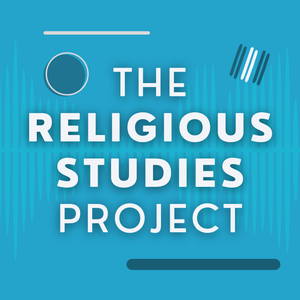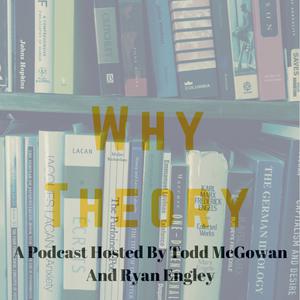
The Religious Studies Project
The Religious Studies Project
Podcasts and Resources on the Contemporary Social-Scientific Study of Religion
- 50 minutes 12 secondsHarm, AI, and Religion | Discourse! June 2023
In our final Discourse! episode of the season, Andie Alexander, Craig Martin, and Paul-François Tremlett team up to discuss the concept of “harm” and religion as it pertains to recent legislation in Texas, the role of religion in politics in Scotland’s recent election for First Minister, and questions of AI, religion, and desire. It’s quite the conversation, so be sure to tune in!
Related Articles
- “Bill to Force Texas Public Schools to Display Ten Commandments Fails” NYT
- “Texas lawmakers approve bill to allow school districts to replace counselors with chaplains” Washington Post
- “Unlicensed religious chaplains may counsel students in Texas’ public schools after lawmakers OK proposal” Texas Tribune
- “Trouble in Texas: Lone Star State legislators are trying to merge religion and public education — and other states are following suit” Americans United
- “Gov. Greg Abbott signs legislation barring trans youth from accessing transition-related care” Texas Tribune
- “Can humans ever understand how animals think?” The Guardian
- “Seeing Spirituality in Chimpanzees” The Atlantic
- “AI will be everywhere, but its rise will be mundane not apocalyptic” The Guardian
- “‘They’re afraid their AIs will come for them’: Doug Rushkoff on why tech billionaires are in escape mode” The Guardian
- “Is No 10 waking up to dangers of artificial intelligence?” The Guardian
- “AI ‘godfather’ Geoffrey Hinton warns of dangers as he quits Google” BBC
- “Alabama Legislature votes to ban gender-affirming medical care for transgender youth” NPR
- “Alabama urges court to revive strict ban on gender-affirming care for minors” Reuters
- “Alabama becomes the 22nd state to allow people to carry concealed guns without permit” CNN
- GlasgowGPT
- “It’s not bigoted to criticize Kate Forbes. Sometimes, in politics, religion is fair game“
- “Kate Forbes says trans women are ‘biological males’ as SNP leadership candidate faces more questions“
4 July 2023, 12:31 am - 40 minutes 13 secondsMediatizing “Evangelicalism”: Authenticity, Identity, and Power
In today’s episode, Daniel Jones talks with Travis Warren Cooper about Cooper’s recent book, The Digital Evangelicals: Contesting Authority and Authenticity After the New Media Turn (Indiana University Press, 2022) and they discuss how issues of authenticity, authority, and power are deeply intertwined with US “evangelicalism” and its mediatization. Be sure to tune in!
12 June 2023, 7:00 am - 42 minutes 30 secondsWhat’s Sincerity Got to Do With American Secularism?
In this episode, Charles McCrary joins Matt Sheedy to discuss the role of sincerity in shaping American conceptions of religion that he explores in his recent book Sincerely Held: American Secularism and Its Believers (University of Chicago Press, 2022). Tracing a cultural history of “sincerely held religious beliefs,” from 19th century court cases on fortune telling and the policing of morality in New York, to conscientious objectors in the 1940s and 1960s, McCrary helps us understand how the U.S. Supreme Court has determined who and what counts as ‘religious’ as American secularism developed over the last century. Questions of race, gender, and sex are also in the mix, as recent cases have shifted the burden of sincerity from the protection of ‘minority’ beliefs to the rights of people and corporations to deny people services if they feel it violates their religious freedom.
Also, as noted by Charlie and Matt in the episode, this discussion is a great conversation partner for our recent episode with Finbarr Curtis, “Spitting on the Sacred: Politics and Redefining Profanation“—be sure to check it out if you missed it!
5 June 2023, 6:06 am - 44 minutes 55 secondsWhat’s Happening Down Under? | Discourse! May 2023
For our May episode, Discourse! heads Down Under once again as ⅔ of our usual suspects—Carole Cusack & Raymond Radford—explore religion, politics, life and death in the Australian religious sphere. They cover a variety of recent issues from the banning of hate symbols and the rise of right groups in the wake of the pandemic, to Australian sovereign citizens and gun deaths, to the deaths of high profile priests and the different (and indifferent) reactions from both politics and media. Be sure to tune in!
Articles Discussed
- “Why were neo-Nazis at an anti-trans rally in Melbourne?“
- “Victoria to ban Nazi salute after ‘disgusting’ scenes at anti-trans protest“
- “Moves to ban Nazi hate symbols across the nation“
- “Queensland police arrest 12 members of religious group over death of eight-year-old Elizabeth Rose Struhs“
- “Queensland police say Wieambilla shooting was ‘a religiously motivated terrorist attack’“
- “6 dead, including 2 police, in Queensland shooting. How dangerous is policing in Australia?“
- “A ‘Lionheart’ to some, a villain to others – George Pell’s funeral proves as divisive as his life“
- “Father Bob Maguire farewelled at Melbourne state funeral as John Safran leads tributes“
- “Anthony Albanese welcomes Indian Prime Minister Narendra Modi to Sydney“
- Depends What You Mean by Extremist: Going Rogue with Australian Deplorables, John Safran
29 May 2023, 6:00 am - 52 minutes 42 secondsCharting the Playful & Proper Study of Religion
In this week’s episode Sam Gill joins RSP editor Andie Alexander to discuss his recent book The Proper Study of Religion: Building on Jonathan Z. Smith. They consider different methodological and theoretical questions in the academic study of religion, such as comparison, difference-making, play & movement, experience, and “storytracking”—a narrative technique and method for critical self-reflection and scholarly analysis. Gill outlines a playful and proper study of religion that builds on the work of the late J. Z. Smith and demonstrates how a critical scholar of religion might apply Smith’s methods in their own scholarship.
15 May 2023, 4:01 pm - 48 minutes 20 secondsSupreme Court to Coulter: Negotiating Religion in the Public Sphere | Discourse! April 2023
In this episode, religious studies scholars Matt Sheedy and Tyler Tully, along with host Candace Mixon, discuss the ramifications of the in-progress Supreme Court case Groff vs. Dejoy, the Catholic Church’s decision to rescind the Doctrine of Discovery, and a recent controversial tweet by the conservative media pundit, Ann Coulter. In threading these discussions together, they consider religion as negotiated in the public sphere and the limits of accommodations across religious boundaries.
In Groff vs. Dejoy, one issue at play is the interpretation of Title VII of the Civil Rights Act of 1964, directly related to workplace accommodations, including for religious reasons. Current precedent reflects on the issue of hardship for the employer in accommodating the request, and that hardship must only be minimal for the employer to find it unable to be accommodated. As the court may widely expand the grounds through which employees may seek religious accommodations, our guests consider the ramifications of this (especially for non-Christian practices and on non-linear framings of time) and connect to broader impacts of religion in recent Supreme Court decisions, such as overturning Roe vs. Wade.
Tully and Sheedy respond to the Catholic Church’s rescinding of the Doctrine of Discovery, demonstrating the Vatican’s “doublespeak” as it downplays the interconnection between “religion” and “politics.” Finally, Sheedy introduces listeners to the incendiary tweet by Ann Coulter that abortion should be banned “for registered republicans only.” The guests consider what happens when legal debates become part of public rhetoric and who is left out when it goes mainstream.
1 May 2023, 8:52 am - 36 minutes 24 secondsKeep Hope Alive: Preparing for White Christian Nationalism
In this week’s episode, Raymond Radford is joined by Bradley Onishi to discuss his new book Preparing for War: The Extremist History of White Christian Nationalism—and What Comes Next (2023). In 2021, as the Capitol building was being overrun in an attempt to stop a transfer of power, many of us were glued to our screens. Some such as Bradley Onishi were not only glued to their screen but counting the symbols and motifs he saw amongst the crowd. Onishi recognised the symbols as various religious organisations and thought back to his own past with Christian Nationalism, asking himself if he were still at his old church would he be storming the steps of the Capitol. Onishi’s new book chronicles the rise of the White Christian Nationalism movement in America, and its connections to the Evangelical movements as they navigate to institute a theocratic regime through creative use of politics and bargain-making. What they want to achieve and how they seek to achieve these powers are explored and discussed as Bradley and Raymond discuss history, motives, and the outcomes of these movements, and why hope is still an option to combat them.
17 April 2023, 9:05 am - 53 minutesReligion under Attack? | Discourse! March 2023
This month’s Discourse is hosted by Suzanne Newcombe, who’s joined by Michael Munnick and Carmen Becker. They start by discussing the recent shooting at a Jehovah’s Witness Hall in Hamburg and how it has reopened discussions about discrimination. They then turn to Scotland, where discrimination is again an issue in the election of Nicola Sturgeon’s successor as Leader of the SNP. Are Kate Forbes’ opinions on equality criticised for being religious, or for not being progressive? And finally, they discuss the case of Isabel Vaughan-Spruce, a pro-life activist arrested apparently for the crime of praying as a protest outside a UK abortion clinic.
Articles Discussed
- “Hamburg holds service for Jehovah’s Witness shooting victims“
- “Hamburg shooting: Seven killed in attack on Jehovah’s Witness hall“
- “Hamburg shooting: seven people killed in Jehovah’s Witnesses hall“
- “Zeugen Jehovas beklagen Täter-Opfer Umkehr” (YouTube)
- “Gedenkfeier für die Opfer: Zeugen Jehovas fühlen sich ausgegrenzt” (YouTube)
- “BELGIUM: Jehovah’s Witnesses acquitted on appeal for alleged discrimination and incitement to hatred“
- “SNP leadership: The perils of mixing politics and faith“
- “Scottish nationalism now ‘more religion than politics’ says Better Together strategist“
- “Kate Forbes faces backlash over gay conversion therapy comments during SNP leadership debate“
- “British pro-life advocate again arrested for ‘thoughtcrime’ of silent prayer near abortion clinic“
- Video of arrest (Twitter)
- “Law and religion round-up – 12th March“
- “CPS rejects charges against Catholic arrested for ‘thought crime’ prayers“
- “Catholic woman prosecuted for silently praying outside abortion clinic is CLEARED after arrest by police sparked fury among supporters who condemned ‘thoughtcrime‘”
27 March 2023, 6:00 am - 46 minutes 49 secondsThe Church of Saint Thomas Paine: Religion without God
In this interview, Dan Gorman talks with Leigh Eric Schmidt about his 2021 book The Church of Saint Thomas Paine: A Religious History of American Secularism. Despite its title, Schmidt’s book is not a religious biography of Thomas Paine, but rather a survey of the ways that atheists and agnostics have used Paine as a symbol or figure of devotion.
Schmidt organizes his book into sections on secular relics (focusing on Paine’s exhumed, missing body), secular rituals (focusing on nineteenth-century Americans who sought new frameworks for life events), and secular institutions (focusing on attempts to organize various churches of humanity). An epilogue looks at secularism in the twentieth century. Several atheist and free thought congregations earned tax-exempt status as religious organizations, but religious conservatives from the Cold War onward stoked popular fears that secularists wanted to take over America. Throughout the book, Schmidt highlights a fundamental argument in the atheist/nontheist community: Does an absence of belief in God mean an absence of religion and all the things that go with it? As Schmidt’s history of Thomas Paine fans reveals, the answer is no; a religion can operate on functional lines without a belief in God.
Other topics of conversation include the effects of COVID-19 on Schmidt’s research and writing process, the design and semiotics of the book’s hardcover edition, conservative critiques of Schmidt’s support for liberal religion and secularism in public life, and the book’s connection to Schmidt’s earlier Restless Souls (2nd ed. 2012).
13 March 2023, 6:00 am - 50 minutes 29 secondsSpitting on the Sacred: Politics and Redefining Profanation
In this episode, Dr. Finbarr Curtis joins Jacob Noblett to discuss the growing phenomena of profanation as it concerns American politics and culture. Rather than define a holistic movement, Dr. Curtis explores the relationship between certain “forbidden” taboos and how they affect democracy in both a theoretical and very real sense. Using his book, Going Low: How Profane Politics Challenges American Democracy, as a guide, the “shock” culture of modern politics is broken down into digestible insights regarding the nature of “winning” and the fundamental conflict between private and public spheres of government influence as it pertains to religion.
Update: This episode is a great conversation partner for our episode with Charles McCrary, “What’s Sincerity Got to Do With American Secularism?” which published a few months later.
6 March 2023, 10:29 am - 41 minutes 52 secondsReligious Literacy and Its Discontents | Discourse! February 2023Join Benjamin P. Marcus, Paulina Gruffman, and Charles McCrary for this month's #RSPdiscourse as they discuss a recent Pew survey on religious literacy and the so-called Asbury revival. Be sure to tune in!27 February 2023, 6:00 am
- More Episodes? Get the App
Your feedback is valuable to us. Should you encounter any bugs, glitches, lack of functionality or other problems, please email us on [email protected] or join Moon.FM Telegram Group where you can talk directly to the dev team who are happy to answer any queries.
 The Daily
The Daily
 The Bible For Normal People
The Bible For Normal People
 Rough Translation
Rough Translation
 Why Theory
Why Theory
 Consider This from NPR
Consider This from NPR
 The Ezra Klein Show
The Ezra Klein Show